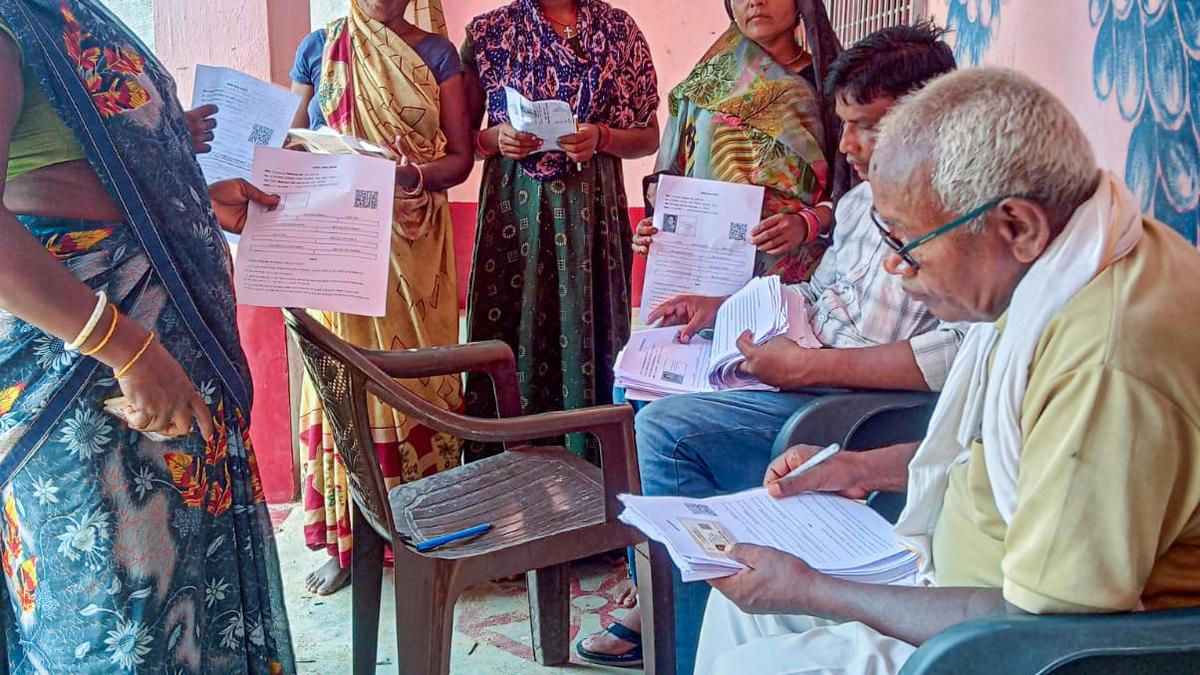Nawada BLO conducts door-to-door distribution of enumeration forms and collection of filled forms under the Special Intensive Revision-2025 ahead of the Bihar Assembly elections, on Sunday.
| Photo Credit: ANI
On June 24, 2025, the Election Commission of India (ECI) announced a month-long Special Intensive Revision (SIR) in Bihar. The stated purpose of the exercise, according to the Chief Election Commissioner, was to “ensure that no eligible citizen is left out while no ineligible person is included in the electoral roll”. Further, anyone whose name was not in the 2003 electoral roll was required to submit at least one of 11 specified documents “as probative evidence of eligibility, including presumption of citizenship”. This implied that Biharis below the age of 40 years would have to fill forms and produce documents to “prove” their citizenship to be eligible to vote. Aadhaar, ration cards, voter identity cards (issued by the ECI) — which are most commonly available — are not among the 11 documents. Ten petitions are challenging the SIR order in the Supreme Court on grounds that the SIR order will disenfranchise lakhs of people. A key constituent that is at risk of such disenfranchisement are migrants. Estimates suggest that there are more than 74 lakh out-of-State migrants from Bihar.

The study
To assess awareness of the SIR process, availability of the 11 specified documents, and other challenges that migrants from Bihar are confronting in proving their eligibility to vote, the Stranded Workers Action Network (SWAN) conducted a rapid phone survey. A report titled ‘For a few documents more’ based on the survey was released recently. SWAN is a volunteer-driven platform that provided relief to over 36,000 migrants during the COVID-19 lockdown and released three reports documenting the multi-dimensional distress that they had been put through.
The recent survey was conducted a week ago by 29 student volunteers. Calls were attempted to 1,411 workers of which the survey was completed for 338 workers. This is not a statistically representative survey but it sheds strong light on the documentation deficits faced by migrants and their risks of being disenfranchised.
About 95% of the surveyed workers were males who average age was 34 years. The majority were employed as factory or construction workers, and the median earnings were ₹14,500 per month. There was a near-perfect match between the share of Other Backward Classes in our sample (28.4%) and the share in the 2022 Bihar caste census. Scheduled Caste workers are 3% points under-represented in our sample, and those in the ‘general’ category are over-represented in our sample by 8% points. There is near-perfect parity in religious distribution in our sample and the 2011 Census.
Lack of awareness
Out of 219 respondents to the question on what documents were needed under SIR, 68% did not have accurate information. The affidavit filed by the ECI on July 21 mentions that the body has taken adequate steps in making online options available for migrants to submit enumeration forms. However, as the chart below shows, 75% of migrants had never heard of the portal, and only two out of 248 had submitted the form online.
As per the SIR order, each booth-level officer must go door to door and visit at least three times in case the house was found to be locked. In our survey, only 53% said that some official had visited their house, while 23% said that no official had visited, and 24% did not know. Among those who said some official had visited their house, in 45% of the cases, the enumeration form along with either Aadhaar or voter ID was taken.
On the ‘eligible’ documents, our survey provides a drastically different picture compared to the ECI’s claims in its affidavit. Page 39 of the ECI affidavit says that “13.89 crore residence certificates have been issued from 2011 to 2025.” This is more than Bihar’s estimated population of 13.7 crore. In our sample, just 32 out of 338 respondents have a residence certificate. The affidavit further states that more than 8.72 crore caste certificates have been issued in Bihar.
The charts from our survey, disaggregated for those who are in Bihar right now and those away from Bihar, show that about 35% in our sample do not have any of the 11 SIR documents, while more than 8 out of 10 have voter ID and more than 96% have Aadhaar. The chart below shows the prevalence of Aadhar versus the lack of prevalence in SIR documents.
To reiterate, the ECI makes the case against using Aadhaar and voter ID, even though these are most widely available. The chart shows the prevalence of voter IDs versus the lack of prevalence of SIR documents.
Questioning the exercise
Unsurprisingly, then, a large fraction of the workers we spoke to questioned the necessity of the SIR and expressed a strong preference for the older process of using Aadhaar or existing voter IDs. One angry migrant worker said, “Agar kisi ke paas document nahin hai, toh kahan jaayega? Gardan kaat ke leke aayen kya (Where will somebody go if they don’t have documents? Should they cut their heads and bring it?).
Minorities felt increased vulnerability at having to repeatedly prove their citizenship. One such worker compared these eligibility tests to “refreshing one’s phone”.
Notwithstanding the impracticality of such a hasty exercise, our interactions with migrant workers leads us to believe that the ongoing SIR exercise will disenfranchise lakhs of people. The survey suggests that the SIR exercise must be immediately revoked.
Anindita Adhikari is a Faculty, National Law School University of India, Bangalore. Rajendran Narayanan is a Faculty, Azim Premji University, Bangalore. This work is part of the SWAN. Views are personal
Source: Survey conducted by Stranded Workers Action Network
Published – July 30, 2025 08:00 am IST
